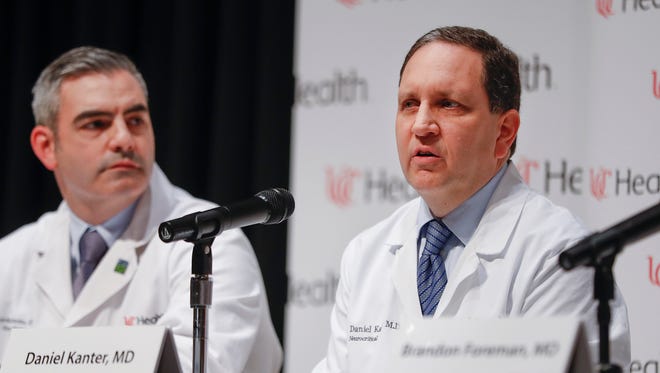Medical mysteries surround end of Otto Warmbier's life

CINCINNATI — An unresponsive Otto Warmbier survived months in North Korean care, came home June 13 and died six days later. His brief life and heartbreaking death offer mysteries on the mixture of medicine, geopolitics and the will to live.
On Tuesday, the Hamilton County, Ohio, coroner reported no autopsy was performed on the 22-year-old's body at the Warmbier family’s request. In her statement, Dr. Lakshmi Sammarco deferred a ruling on the cause of his death.
“No conclusions about the cause and manner of Mr. Warmbier’s death have been drawn at this time as there are additional medical records and imaging to review and people to interview,” her statement said.
More:Top senators say U.S. should consider banning North Korea travel
More:Otto Warmbier's high school graduation speech reflects on 'good old days'
The funeral for Warmbier is scheduled for Thursday at his alma mater, Wyoming High School in Wyoming, Ohio. Nationally and worldwide, his death means a lot of things to a lot of people. But in Wyoming, it’s not about political retaliation or a ban on travel or a show of military force. There it’s about the death of a son. A brother. A neighbor. A friend.
University of Cincinnati Health doctors treating Warmbier, who spoke at the family’s request last week, declined Tuesday to answer further questions. Warmbier stayed at University of Cincinnati Medical Center since his arrival at Lunken Field in Cincinnati from his 18 months of captivity.
His family had not heard from him since he had been convicted of a state crime in March 2016 and sentenced to 15 years in prison. After all that silence, the Warmbier family and the world learned last week that Warmbier had lived for at least 14 months in a state of unresponsive wakefulness, a relatively new term for the condition also called persistent vegetative state.
More:North Korean treatment of Western prisoners is bizarre, not always physically brutal
More:Trump on Otto Warmbier: 'At least we got him home'
Unresponsive wakefulness occurs after a severe brain injury. The damage leaves a person unable to respond to commands, move or respond to stimulus although that person can yawn, sleep on cycle and breathe without mechanical assistance. Clinical studies suggest some people, especially the young, can be roused from a state of unresponsive wakefulness, but everything depends on the level of damage to the brain.

The length of Warmbier's survival while in unresponsive wakefulness is remarkable because of the meager state of North Korean health care. The nation lives with the legacy of the “arduous ordeal,” a devastating famine in the 1990s that killed as many as a million people. While the World Health Organization says North Korean food production appears to have improved, the health care system is devastated, and hospitals lack the basics.
Upon Warmbier’s release, the official story out of North Korea is that shortly after his conviction in March 2016, Warmbier became ill with botulism — a toxin or naturally occurring poison from a bacteria commonly associated with food poisoning — and given a sleeping pill. Today, most Americans are familiar with the botulism bacteria because it’s sold as Botox, to smooth wrinkles and paralyze damaged nerves to end pain. But untreated and out of control in the body, botulism attacks the nervous system, breathing and heart function. A sleeping pill is not an antitoxin that will counteract botulism.
Last week, Dr. Daniel Kanter, a University of Cincinnati Health neuroscientist, described Otto Warmbier’s brain as severely damaged everywhere.
More:Tour group says no more Americans to North Korea after Warmbier's death
More:Otto Warmbier, imprisoned in North Korea, dies in U.S.
From the magnetic resonance images taken in Cincinnati, Kanter said Warmbier’s injury most likely occurred because his heart stopped, cutting off oxygen to the brain. It's possible that botulism damaged his heart and lungs, but Kanter said no trace of botulism was found in Warmbier — and it would not have lived in his body 14 months. There was no indication that Warmbier was treated the customary antitoxin to halt the nerve damage.
In another hint about the level of medical care available in North Korea, Kanter mentioned a data disc of medical information about Warmbier collected in North Korea, including test results and scans of his brain dated April and July 2016 showing progressive damage.
The tests at UC Health also showed no traces of trauma or physical abuse, such as broken bones or organ injury.
One conclusion from the condition of Warmbier’s body: He got a level of medical care virtually unheard of for most North Koreans. He survived unable to communicate or move for 14 months, so someone took care of him. He came home in what Kanter called a “well-nourished” condition, so someone made sure he got nutrition and water. Kanter was able to review contemporaneous medical records, so someone knew the information was worth keeping.
More:Who was Otto Warmbier — the student released from North Korea?
More:Otto Warmbier: What is Unresponsive Wakefulness Syndrome? Can he recover?
It’s impossible to know how much Warmbier understood about his surroundings as his life came to its close. But his parents, who in the last week had to absorb the worst possible information about their child, said in a statement that one element of the medical situation, one that could never be measured, made all the difference.
The night their son returned home, he “looked very uncomfortable — almost anguished. Although we would never hear his voice again, within a day the countenance of his face changed — he was at peace. He was home, and we believe he could sense that.”
Contributing: Hannah Sparling, The Cincinnati Enquirer. Follow Anne Saker on Twitter: @apsaker
More:Doctors: Otto Warmbier in state of 'unresponsive wakefulness'
More:Otto Warmbier has suffered a 'severe neurological injury,' doctors say
More:What is botulism? Comatose U.S. college student Otto Warmbier released by North Korea
More:U.S. college student released by North Korea arrives back in Ohio